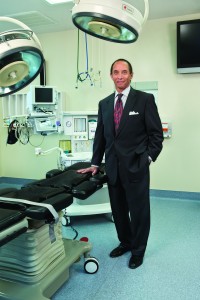| << Back |
Meet Your Neighbor: Stephen Gordon, MD
How many times have you heard about the importance of looks? As Americans we take for granted much that affects our overall appearance and well-being. In third world countries it’s not about looks, but rather, the ability to survive. 89117 resident Stephen Gordon has made a career of performing surgeries that not only improve appearance, but also improve lives.
Gordon completed his Plastic Surgery residency at Emory University in Atlanta and later entered private practice there. For the first five years he was on staff at 12 hospitals and on call every night. He kept busy with trauma and reconstructive plastic surgery until he made the decision to develop a cosmetic surgery practice. Since moving to Las Vegas over fifteen years ago, Gordon has lent his expertise to the community and to programs that make a difference. He has long thought it better to give of his time and assistance to ensure that the contributions he makes directly benefit the people he serves.
At home in Las Vegas, he volunteers each month as a ringside physician for amateur boxing. He also travels to places like Africa and other third world countries on medical missions to help the people who would have no way of obtaining treatment for deformities such as massive keloids, cleft lip and palate as well as burn scar atrocities and reconstructive challenges. As a result of his travels, he and his wife have founded The Stephen and Lori Gordon Plastic Surgery Foundation to provide surgical care and consultation to third world countries. Gordon provides insight into the widespread needs in these areas and why he is so passionate about involving other medical professionals.
Tell us about The Stephen and Lori Gordon Plastic Surgery Foundation.
“We are currently seeking not-for-profit status so that we can receive funding and material contributions and participation by other medical professionals to help those in need. I am regarded as a goodwill medical ambassador and the capacity in which I perform ranges from training and performing medical procedures and surgeries to providing integral information about the facilities I have visited along with recommendations on improving services to the community. For example, I identify and report unsanitary conditions such as insufficient running water, or over-extended physicians.”
Any observances you’d like to share about your medical missions?
“African medical facilities are still 100 years behind the medical community in the United States. There is little or no formal medical training beyond six months in pediatrics, internal medicine, OB/GYN and surgery (two years). As a barometer, an American surgeon trains for a minimum of five years after medical school to become a general surgeon. Part of my mission there was to train the local doctor in plastic surgery techniques such as skin grafting, but he missed most of the surgeries because he was seeing as many as 200 people a day in his emergency clinic.”
Based on your findings, are burn accidents prevalent in Africa?
“Those living in small villages have to pump water from a well, carry large buckets to their hut and then sterilize the water over an open fire in order to have drinking water. Practically everything they consume is prepared this way so there are many burn victims. Most of the time the victim lives with a permanent disability or disfigurement because they do not have access to appropriate timely medical care.”
How does it feel to have helped so many in need?
“Despite many hurdles, it was rewarding to repair an eleven-year-old girl’s cleft lip, or to remove a massive keloid around a handsome, yet depressed, twenty one year old man’s neck. From that moment on, I never saw them without a smile on their faces.”
What does giving back mean to you?
“Not only is it necessary for community survival and growth, it is a spiritual principal that you reap what you sow.”








